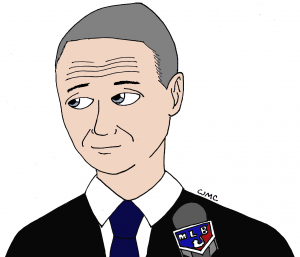When the baseball season begins on April 5 of this year, there will be a new commissioner of the best league of the nearly 177-year-old sport’s history. After the very traditional almost two-decade reign of former commissioner Allan Huber “Bud” Selig, baseball fans have been both weary about and intrigued by the new position holder, Rob Manfred. Baseball fanatics around the country have been surprised by the comments he’s made regarding some of the most pertinent questions and controversies around the integrity of the league.
Robert D. Manfred Jr., born and raised in Rome, New York, grew up an avid New York Yankees fan. After obtaining a B.S. from Cornell University and graduating Magna Cum Laude at Harvard Law School, he came onboard the MLB bandwagon as a consultant to the committee of owners during the infamous strike of 1994-1995, in which a total of 948 games were canceled.
In 1998, Manfred was hired permanently as the Executive Vice President of Economics and League Affairs. In this role, Manfred led the MLB’s investigation of the “Biogenesis Scandal” in 2013. At the end of the 2013 season, former commissioner Selig promoted Manfred to be Chief Operating Officer of the MLB.
Selig’s confidence and influential position convinced the owners committee to vote on, and select, Manfred, who is hoped to bring unconventional wisdom and experience in regards to controversial issues in the league.
When posed with questions on the influence of performance enhancing drugs (PEDs) on Hall of Fame voting, the new commissioner argued that he doesn’t believe that making a jurisdiction of a punishment without a “positive drug test” is “fair.” Manfred added that he doesn’t “advise voters” to judge a candidate based upon “speculation” regarding PED use.
He has also dealt specifically with the Alex Rodriguez shenanigans of 2013. Manfred has guaranteed that major punishments for similar actions will be enforced in the future, and he agrees that his “forgive and forget” policy regarding the Rodriguez issue is “part of the bargain that makes severe penalties work.”
In the next five years of Manfred’s term, baseball fans should expect to have the MLB become “more attune to the society that we live in.” Manfred believes that the MLB will continue to expand if the sport parallels itself with our current fast-paced and highly technological society. These beliefs are demonstrated with his proposal to install a pitching clock which would provide a pitcher with 20 seconds after the end of a play to make the next pitch. This is in order to speed up playing time as television ratings for baseball games, even the playoffs, are down significantly.
In response to the 2014 regular season’s record-low batting average of .250, Manfred has been quoted to be in favor of banning the defensive shift, a strategy that has been executed by the smartest minds in the game to slow down some of the league’s most dangerous lefty-power hitters. Manfred has made it clear that a balance of offense and strong pitching will make the game more riveting to watch.
Rob Manfred’s views of how the game should be executed and played are far more modern than those of his predecessor.
As a baseball nerd and someone generally fascinated with all aspects of the game, I’m confident in Manfred’s revival of the league. But, my uncertainty as a fan resonates from Manfred’s unique interpretation of the traditions and integrity of the MLB.
Powell is a member of the class of 2018.







